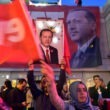In June, The Washington Spectator published my long-form investigation into the complicated history behind the January 6th insurrection, Paranoia on Parade. Covering nearly a century, the piece was the result of several years worth of collaborative research, looking into root causes and obscure movements that busy reporters at our daily papers understandably have little time to consider.
At the invitation of Hamilton Fish, editor of the Spectator, I’m now also looking forward to publishing a monthly column here, where I can share insights and analysis in something closer to real time, while also pursuing long-form, sense-making investigative work. And I’m indebted to both Ham as well as my network of research partners who make any of this work possible.
I did not arrive in the world of investigative journalism intentionally. My educational background includes a focus on both history and computer science, and I have been a professional technology entrepreneur since I was a teenager — now several decades ago. I became involved with online culture and the internet in the 1980’s. I started and successfully exited several technology businesses and have been fortunate to be able to pursue a variety of projects I find challenging and worthwhile.
Since 2007, I have been heavily involved in analyzing data from social media platforms, such as Twitter and LinkedIn. For the last five years, I’ve focused on research and journalism with the intent of countering threats to our democracy. I’ve worked with many journalists and researchers to help document and counter ongoing threats in the information environment.
I’ll be focusing on keeping you up to date on emerging stories and trends that other outlets may not have the patience or capacity to cover, with a particular focus on irregular warfare, networked insurgency, and the alternate belief systems that animate these phenomena. Many of the stories my team and I are following derive from empirical network analysis. Our practice has been to let research, data, and evidence take us to the story — rather than the other way around.
As we head into the midterms and the eighth month of Vladimir Putin’s disastrous and cruel war in Ukraine, Americans are distracted by the team sports-style of coverage that most journalism delivers around election time. While that’s understandable, my colleagues and I mostly have our eyes elsewhere.
The anti-democracy forces we saw on display on January 6th, which included individuals connected to Putin’s regime, Falun Gong, the Moonies, and a variety of domestic anti-government (and historically anti-communist) networks have not faded away, but rather are aligning globally.
As Russia’s military continues to falter in Ukraine, Putin’s tactics have become increasingly desperate with forced mobilization, referenda held effectively at gunpoint, and illegal annexations that the international community has mostly refused to recognize.
Elon Musk has become part of Russia’s propaganda thrust, serving as a proxy voice for the Kremlin, suggesting that Ukraine simply “compromise” — or risk the eruption of nuclear war. Tensions are heightening with North Korea, and propaganda channels are also suggesting that conflict between China and Taiwan is imminent.
Putin is also focused on establishing a new global economic bloc. Their intention is to pull together “BRICS+” countries (Brazil, Russia, India, China, South Africa, and other friends like Iran and North Korea) into a unified economic zone not dependent on SWIFT, NATO, or the European Union. Representing over 3 billion people, they intend to use XRP, a cryptocurrency run by the company Ripple, as a way to bypass SWIFT and avoid sanctions. Additionally, various oligarch interests are lining up around metals-backed cryptocurrencies. So rather than Bitcoin, they are opting for digital currencies backed by nickel, gold, copper, palladium, and the like — resources Putin and his allies have in ample supply.
Underlying Putin’s economic strategy to confront the West is a two-fold approach. First, to empower a global network of royalist, faux-royalist, and separatist networks, intent on challenging their national and local governments. Second, to implement the esoteric ideas of Russian “cosmist” Vladimir Vernadsky, later popularized in the West by Pierre Teilhard De Chardin, centered on the concept of a noosphere (“mind sphere”) — a kind of global brain theorized to emerge with the expansion of communication networks such as the Internet.
Putin is advancing the noosphere as an alternative to the system of individual state sovereignty which has been the norm since the treaty of Westphalia in 1648. As a 2020 RAND report lays out, Vernadsky and the “noosphere” concept is rather well-known in Russia, and is part of Russian Cosmism, a philosophy of science that challenges Darwin’s theories in favor of a more unitary, anti-positivist approach to exploration of the universe. Putin appears to be offering noocracy (literally “rule by the wise”) to his autocratic allies as an alternative vision to the perceived failures of sovereign liberal democracy.
Russia expert Marlene Laruelle dedicated the first chapter of her (free) 2018 book, “Russian Nationalism: Imaginaries, Doctrines, and Political Battlefields” to Russian Cosmism, stressing its centrality to the nationalist worldview. Putin’s Chief of Staff Anton Vaino claims to have invented a “nooscope,” a device to measure the global consciousness and our progress towards realizing the noosphere. Artifacts in the information warfare theater also suggest that Putin is, at least aspirationally, actively pursuing this approach — even as facts and reality continue to get in his way.
We are hard at work on an investigation that will lay all this out. Western analysts should expand their thinking about the nature of this conflict, its scope, and the ideas that animate it. Tuning the knobs on the set — voting out a few politicians, or sending aid to Ukraine — is necessary but not sufficient to address the broadly scoped 4th generation total and spiritual war we now find ourselves in. Grasping the breadth of the conflict requires looking in places few care to look, and applying imagination far beyond what we’re used to seeing displayed on cable television news.
Dave Troy is an investigative journalist focused on exposing threats to democracy. Based in Baltimore, his background as a technologist with an interest in studying online extremism affords him a unique perspective. His work has appeared at MoMA in New York, and he is a fellow with New America Foundation’s Future Frontlines. Dave writes regularly about information warfare, history, and politics. He is the host of the podcast Dave Troy Presents, and speaks regularly at conferences on disinformation, extremism, and information warfare. Contact information is available at davetroy.com.






What is their plan when they die? Putin, Musk, etc. This is fascinating and I’d like to understand more which is why I ask. Do they have heirs?